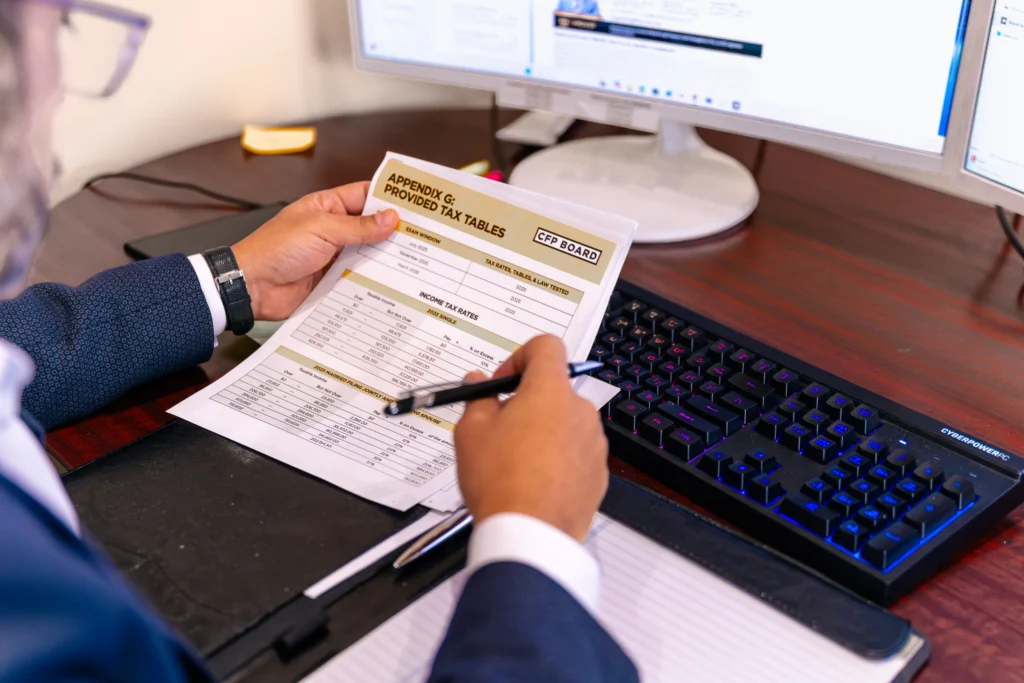Cynthia de Fazio 00:28
Cynthia, welcome to Retire Smart Austin. My name is Cynthia De Fazio, joined today by Phil Capriotti, senior of Empower Wealth and tax and to our viewers at home, we have a very important show today. We’re going to talk about why you should be working with a financial advisor, and how do you select the right one? That’s a big question. How do you know it’s the right person for you? Phil, how are you today?
Philip Capriotti 00:51
Marvelous. Thank you for asking, Cynthia, how you doing today?
Cynthia de Fazio 00:55
Fantastic. Thank you for asking, I love all of our shows together. And wow, we had a couple impactful ones there talking about some tax changes that could occur back-to-back. It was amazing.
Philip Capriotti 01:07
We had a lot of we had a lot of calls come in fact, we actually had a couple calls come in, and one lady said, I don’t really have to worry about taxes. Unfortunately, she said, but I am going to get up and go out to vote.
Cynthia de Fazio 01:20
Oh, that’s fantastic, see we touched person. That’s really the goal.
Philip Capriotti 01:24
Yeah, and that is, that is really the goal. And because not everybody has a tax problem, but most folks realize you’ll know when you have a tax problem. You know it. You may not know what the tax problem is until it’s highlighted and outlined for you, which really lends right into the topic of our show, are you working with the right financial advisor? Exactly?
Cynthia de Fazio 01:44
Because that’s a very important question that a lot of people are probably asking themselves. And how do you know that you’re being taken care of in the right way? We talk a lot about this. Phil, it’s a very important topic, obviously, because people can sometimes be confused. They’ll say, Oh, my financial advisor, well, things are okay. We’re doing okay. What does that even mean? You’re doing okay?
Philip Capriotti 02:05
I’m not even sure what that- what that means is they have a clue. That’s what that means, my thought. And this goes out to not only all of you viewers, but it goes out to all of you financial advisors. Don’t you feel like you’re under serving your clients by not helping them understand the effects of tax taxation on their retirement plans. I mean, when I get up, you know, I was funny. I was at mass about a couple weeks ago, and I was thinking, you know, I was kind of staring into space. I was listening to the homily, and I’m staring into space, and I’m thinking, why do you do what you do? Phillip, why it? Why is it do you do? And I realize, and I already know what it is, but I answered myself, because you care about helping people. Yes, you do. You care about giving back to your brothers and sisters in the community, most of them, and I would say 95% of them, work with a financial advisor that doesn’t have a clue with respect to taxes. Worse, worse, they are advising folks not to execute Roth conversions. Wow. And I’m talking to you financial advisors out there with your clients that have high six-digit, seven-digit, and some of our clients, eight-digit accounts. If you not, are not talking with them about executing Roth conversions and you don’t understand it. Maybe it’s too complicated for you, or maybe you’re just, quite frankly, I don’t want to use the word lazy, but sometimes folks don’t want to learn. They get complacent. They’re stuck in a spot, and they’re okay, right there. Go talk to your CPA. Let me clue you in the CPAs that I know, because we teach classes to CPAs, CPAs that I know are looking at your tax situation today. They’re taking a snapshot of how do I get the lowest taxes for you today, they are not looking down the road three years from now, five years from now, 10 years from now on, how tax efficient an individual’s retirement account is going to be. I would venture to say if your financial advisor is not also your tax advisor. There’s a high probability you’re working with the wrong advisor in retirement. Absolutely. Now, granted. I mean, interrupt, but granted, they may have been fine while you were accumulating assets and building during the accumulation phase, but with respect to the distribution phase of your life, in retirement, they are doing a no service. They truly are, in fact, I believe, a disservice.
Cynthia de Fazio 04:51
Absolutely. And Phil, I want to ask you a question. Obviously, there are so many different types of financial advisors that people need to be aware of, including registered investment. Advisors, financial planners, wealth managers and brokers. How does someone even know who they’re working with or what title they hold or what designation? How do you ask?
Philip Capriotti 05:10
It comes down to broker, broker check. So normally, what I do, and most folks don’t realize this, is, I’ll broker check every single advisor when a client comes in, and even if they have some dings, I don’t really bring it up or anything of that nature, but you need to do the research. Check out your advisor. First of all, see if your advisor has a series 65 investment license. Now, what that means, folks, a series 65, that makes your registered investment advisor, and IAR, an individual advisor representative. What does that mean? That means that they are licensed and obligated to act in your best interest, just as your attorney, just as your CPA. Now that doesn’t mean that. And again, I don’t want to cast aspersions on any of the big box retailer advisors, right? I mean, we have nine or 10, and I won’t mention the name at shops, okay, on every block, just in Horseshoe Bay, in Marble Falls, it’s the same. It’s the same. It’s not the same person, okay, but it’s the same firm, okay, okay, well, they work for that firm. They don’t necessarily work for you. So, you want to make sure that your advisor works for you. So, ask the question, and I wrote a book about the top questions they asked your advisor. We’ll just bring a couple. Ask them if they are obligated to act in your best interest 100% of the time, and if, for some reason, they don’t, if they’re acting more in the company’s interest, in other words, selling products that the company might be telling them to sell when there are similar products that might be better with lower internal fees and so forth, or are they- will they be financially liable to you? See what their answer is.
Cynthia de Fazio 07:07
Great question, Phil.
Philip Capriotti 07:10
See what their answer is, because chances are, if they work for a firm, they actually, they do not own the company. They’re an employee. That’s very true. They get paid by that company. They are influenced many times by that company’s policies, just like we’re influenced by tax policies that are- could possibly be passed. Sure. So, you want to work, in my professional opinion, with a registered investment advisor. I want to work with someone that is legally obligated to act in my best interest and what I do for you, I don’t talk to your neighbor or your friend or anyone unless with your permission. So also, you want to work with an advisor that specifically builds your portfolio and retirement plan on your specifications many of these big box retailers. And again, I’m not trying to come down hard on you folks, but I know the difference, and you know the difference as well. We have these plastic paint by number portfolios. You can see an advisor in Horseshoe Bay has the same portfolio as the advisor, as the individual, the investor in marble fall. It could they could be in Delaware County, Pennsylvania. It’s kind of like going to McDonald’s. Wow. You can get the same double cheeseburger. Okay, it even tastes the same whether in Philly, Jersey. You want to make sure that your retirement plan and investment plan is customized to you, and if you’re married, you and your spouse. So, this is all part of acting in your best interest. Ask the hard questions. Now, one of the difficult questions that we have is, you know, I’ve been with my advisor for so long. You know, it’s kind of like getting a divorce and I tell folks, and I say, I understand that. I understand it completely. Relationships sometimes don’t need to be broken to switch advisors. If the relationship is strong enough, you have to ask yourself, What’s more important to you? Your retirement account, or your advisor’s relationship.
Cynthia de Fazio 09:25
Great point.
Philip Capriotti 09:26
What’s more important? Great what’s more important to you, how much you give back to the government in retirement, okay? Or the fact that your advisor isn’t a tax advisor too, so it’s not really his responsibility. It really comes down to you and your family and me. I’m family you oriented. Yes, you are. Comes down to me, comes down to my family. It comes down to my children and my grandchildren. And as far as I’m concerned, if you can’t be true to yourself, you really can’t be true to anyone.
Cynthia de Fazio 09:55
Bill, thank you so much to our viewers at home. We have to take a very short commercial. Rick here on Retire Smart Austin, we know that you’re in the audience today, and you’re asking yourself, am I working with the right financial advisor? Well, if you’re unsure, this is the perfect opportunity to call in the number is 888-818-6557, you deserve to have someone in your retirement years that’s truly looking out for your best interest. Remember, it’s such a beautiful blessing to work with a fiduciary. You have the gift of knowing that that person is choosing something that’s going to suit your needs. It’s not going to be a cookie cutter plan. This is going to be something designed specifically for you, customized 100% the number is 888-818-6557, or snap that QR code at the bottom corner of your screen that will take you right to Empower Wealth and tax landing page. You can schedule your time accordingly. Phil reserves five spots per week for new viewers of the show. We’ll be right back momentarily on Retire Smart Austin.
Philip Capriotti 11:00
One of the secondary reasons I got into the tax business is my very first job. It was an usher at a movie theater. So back in my day, since my baby boomer people would come, we would tear their ticket, and we would walk them down, see them, and then come back. So up until that point, I was getting $5 a week for allowance, and I’m telling you, I was like an indentured servant. My brother was allergic to grass and pollen, so I had to do all the lawn work. I had to do all of the works, a matter of fact. So, I get my first check. I have 37 and a half hours. I’m making $2.10 an hour. This check’s going to be close to $80 I look at the check and I sticker shock $41.78 I’m good at math. That’s not adding up. I go over to the manager. He says, oh, Phil. He says, flip the check around, federal income tax, state income tax, FICA tax, all of these different taxes. So that was my first lesson at 15 about how important paying taxes are and by the way, I think that anyone that has paid taxes every year for 50 years by the time they’re 75 they should be tax free. I don’t care where they put their money. That’s my belief. I believe we’ve done our fair share.
Cynthia de Fazio 12:21
Welcome back to Retire Smart Austin. My name is Cynthia De Fazio, joined today by Phil Capriotti, senior of Empower Wealth and tax and we’re talking about a very important topic, choosing the right financial advisor, and why you should be working with a financial advisor, specifically approaching the retirement years, Phil, we tapped in a little bit about the importance of working with a fiduciary, because we know that that level, that standard of excellence, provides your clients the guidance to know that you’re picking something for them or suggesting something for them, that you would actually tell a family member, that you would choose yourself. You’re listening to what their best interests are. And so often that’s not the case with other firms, if you will.
Philip Capriotti 13:01
Well, the thing is, many times, you know, it’s kind of like the they go through the courting stage, and then after you’re married, you don’t have to try anymore. I don’t agree with that. Try even harder. Okay, same with your financial advisor. So, when you do a review each year with your financial advisor, my professional opinion, hey, should be looking at your tax return. They should be looking at your portfolio gains. They should be looking at what you could potentially lose in a market downturn. They should be looking at what you’re paying for part B, Irma tax, if you’re on Medicare and Part D tax? Are you paying 170 and change? Are you paying 600 and then look for ways to help you by choosing investments that are tax efficient, maybe even tax deferred, that can reduce your taxes. Remember, 10 dimes in $1 that’s all you get. That’s all you get. Okay, I want to keep all 10 in retirement. So, if you’re working with an advisor that’s not doing a Tax Review, let me give you an example. I’m going to tell you what we do with our clients and everyone that’s been to our office, 1000s of people, over 78,000, since 2005 we’ve done it’s almost like the same thing. The first thing we do is a Social Security Maximization report. I want to help the client understand that based on what the husband and or if they are married, wife paid in this is your best or suggested strategy based on your other assets to make your retirement plan the most tax efficient, there has to be a reason. Sure, that’s the first thing. That’s number one guide you with helping you understand what Social Security Strategy you should implement. Okay? The second thing they should do, okay, and this should be. Done yearly, okay, is a retirement income plan written, a written retirement income plan that shows number one your investments in all separate categories, tax deferred investments, IRAs, 401, case, taxable investments, like joint investment accounts, and then Roth IRAs, and the insurance policies you may have. I had a client come in the office. Give you an example. Check this out. Had a variable annuity for 4.2 million. Okay, okay, we did the research. We called the company to find out what the internal fees were. 3.2% Wow. Do the math, 3.2% on $4.2 million it’s $137,000 and change or in and around that. And I’m talking to the client, I’m like, did your- did your investment advisor review this with you? Oh, wow. So, this is the type of things we want to look at, all of these internal fees. And they should be, they should be reviewed. When I ask a client that comes into the office, a potential client, someone that calls into the show, either watching listen to the radio or watching TV, what are your fees? How much are you paying your advisor? Honestly, three out of four, they don’t know. How about the internal fees in your mutual funds. I don’t know. Doesn’t your advisor review that with you every year? No, well, that’s the wrong advisor. So, I’m just we’re talking to show how do you know you’re working with the right advisor? Absolutely. My number one, getting a second opinion and looking at these things, if any of these topics I have brought up, right now, you’re not receiving you should be picking up that phone last year, a year before, and dial in, 888-818-6557, and come in for that consultation. So, you should have a written retirement plan. Inside of that retirement plan you want to structure, how much do I want to spend, or if I married my wife, and how much do we want to spend in retirement after taxes, I want to adjust it each year for inflation, at least 3% inflation. I want to adjust it for what my tax bracket is, how much I’m paying in taxes. And then I want to coordinate based on the returns in my IRA and my 401(k)’s, I want to calculate what is my estimated required minimum of distributions going to be when I reach the attained age, whether it’s 72, 73, 74, or 75 okay, so if your advisor is Not structuring an RMD distribution report in your retirement income plan, in my professional opinion, you’re working with the wrong advisor. Absolutely, because these are the things that cause the major tax nightmares in retirement. And now we’re talking about an individual that’s 7580 and can’t do or it’s very difficult to do anything about it sure, because time is limited. Time is limited, and now you have to take RMDs, and you’re not allowed to convert an RMD to a Roth if you start doing Roth conversions. And I had many clients to do, they’ve come from other advisors. They didn’t even understand RMDs. They’re like, I don’t care now. And on the RMD issue, if you’re charitably inclined, which my family and I, we are okay, and most folks are, once you get to RMD eight, you can do qualified distributions. I’ve had clients come in and they’re taking an RMD, taking it, giving it to their church or their charity. It’s showing its income on their return, instead of paying the RND directly to the charity. So, they’re little, tiny, little choices, and these details, if they’re not being looked at, if your financial advisor is saying, check with your CPA or check with a tax specialist, you’re with the wrong financial advisor.
Cynthia de Fazio 18:58
100% Phil to the viewers at home, there’s a number to call on your screen, 888-818-6557, each week, Phil and his team set aside five spots only for new consultations to new viewers of the show. If you’re in the audience today and you’re asking yourself, Wow, am I working with the right financial advisor? Have I heard from my financial advisor about these very important topics. We went under the gun at a little bit with the tax changes that were coming potentially. And we’ve also talked about the fact, what if you’re not hearing from your advisor, what if you’re working with someone that’s really specifically talking about the accumulation years versus distribution? Well, there is a difference, and today is your opportunity to find out what that difference will be by calling in to 888-818-6557 or grab your smartphone, click on that QR code the bottom corner of your screen that will take you right to Empower Wealth and taxes landing page, and you can book your time according And remember, only five spots are open this week. We’re going to take a very short commercial break. We’re talking about the importance of choosing. The right financial advisor and why you should be working with a financial advisor. Stay tuned.
Announcer 20:12
The work never seems to end until the day it finally does. After nearly a lifetime on the job, you should be rewarded for all the time you spent working, whether that’s crossing off items on your bucket list, learning a new passion, or rekindling the love of an old one. After all, life isn’t over when you stop working. It’s the start of an all-new chapter, the one where you’re the writer and you get to choose how your story will go. A way to achieve that is by having a clear financial plan to sustain your golden years. The biggest fear most retirees have is if they’ll have enough money to maintain the lifestyle they’ve always enjoyed. Having a plan to help protect you against the curveballs life often throws will help to maintain your lifestyle. Call today to get your free written financial plan so you may live every day to the fullest and enjoy the retirement of your dreams. You
Cynthia de Fazio 21:04
Cynthia, welcome back to Retire Smart Austin. My name is Cynthia De Fazio, joined today by Phil Capriotti, senior of Empower Wealth and tax. And we’re talking about a very important topic, how do you know you’re working with the right financial advisor? And most importantly, why do you need a financial advisor? Phil, staying on that same vein, I want to ask you a very important question. So often we hear in the viewing audience and just around the country, if you will, people who say, financial advisor. I don’t need a financial advisor. I got this. I can go to YouTube. I can do it myself. What do you say to that?
Philip Capriotti 21:37
I say, wow, look out below. So, it’s good. I like when folks want to be assertive and independent and a chance. And most of the time, when you have an individual that works as their own financial advisor, they’ve had some bad financial advisors in the past. That’s what I’ve noticed. I would say this, that’s good that you work with a financial advisor, then you can understand the differences of working with a financial advisor who structures tactical, tactical and active wealth management, because many of these folks won’t. What I normally see is we have companies that are doing extremely well with AI chip and so forth, and they may load up 10 I have folks coming in with portfolios 40% of their millions of dollars, 235, ten million in one company. Okay? I like the company too, but the fact of the matter is, it’s too many eggs in one basket. So, what I say to folks like that is, if you’re married, does your wife do financial planning as well? So, let’s assume for a moment, Mr. Smith. Smith, that’s safe. Okay, I was going to say Mr. Financial Advisor, but Mrs. Mr. Smith, yeah, either way. Okay, what happens when you pass away, or if you predeceased your wife, who’s going to take care of your portfolio? And you know what I hear, my kids are going to take care of it. Okay? So, we’re living in a state of denial. Next question I ask, Are you a tax advisor? Do you do your own taxes? Great. Do you keep up with all the tax law changes? Wonderful. Do you understand RMD distributions? Do you understand that when you pass away, you’re going to go from married filing joint into a single return, and if you predeceased, your wife, she’s going to have to take those RMDs filing as a single where her tax bracket doubles. Have you looked at that? Mr. Smith, wow. So, fact of the matter is, being your own financial advisor is a good thing, but you should work with a professional. Remember what we said on the outside of this show, if your financial advisor is not a professional tax advisor, chances are you’re working with the wrong financial advisor. Absolutely. So that that refers to you. Mr. Smith, yeah. Now, if you are a tax advisor, let it tell you a story. So, I have an accountant, CPA. It’s amazing how many CPAs call and come into the office, and I ask them, I say, You’re CPA, you know this stuff, they’re like, No, I really don’t. Man, I was a comptroller of the cover company, okay, but I want to know about it. But the fact of the matter is, I understand the importance, because without addressing it, this could be a major windfall for the government as they change different tax laws. And I said, Well, you’re right, and you work with a financial advisor? I absolutely do. Do you work with a tax advisor retirement? No, I don’t. In fact, I have people in my community saying, Hey, Joe, your CPA, what should I do with my portfolio? They’re actually coming and asking this guy, and he’s coming to me. So, I tell folks, if you’re your own financial advisor, that’s great. Are you your own attorney? Are you your own tax expert? Do you run a Morningstar report on your own portfolio? So, I say continue to do it, but don’t be shy about coming in and getting a second opinion. All financial advisors are not created equal. As a matter of fact, I’m going to say maybe, maybe one out of 25 maybe one out of 50 actually is a licensed fiduciary that’s also a tax advisor and specializes in retirement distribution planning, because what I’m seeing, and I we have reviewed literally 1000s of portfolios. Our home office have structured 1000s of Morningstar Report reports on portfolios, portfolio observations, making recommendations, quantity reports and retirement income plans the advisors simply aren’t doing that. So, my question would to you would be, why haven’t you already picked up the phone? Why haven’t you dialed 888-818-6557 and come into our office and let’s talk about let’s make a comparison between what I believe a true financial advisor in retirement is, and maybe, whether you’re working with yourself as a financial advisor or another financial advisor, let’s do a comparison. Let’s see if we can help. And by the way, I actually help a lot of independent individuals that are very, very emphatic on working with their own portfolios. And when they come in, we’ll, I’ll give them hints, I will, and they’ll say, Phil, I didn’t think, Phil, thanks. Thanks. They may not work with me, but we’re still letting them leave with education and knowledge.
Cynthia de Fazio 26:53
And you’re very passionate about education. You love to just give that knowledge and Phil, with only a minute left of the show, you have a very special offer. Let’s talk about that one more time. Yeah,
Philip Capriotti 27:03
folks, give us a call. Come on in. Let’s have a meet and greet. You know, most of you folks have been watching me for the last four years. Some even longer, been listening to me on the radio. Pick up the phone call, pick up the phone and make the phone call. Come on in. Let’s have a meet. You’ve met me by watching me on TV. Allow me to meet you and interact with you in the office. So, God bless you all. Dial 888-818-6557, come on in for a complimentary consultation, and let’s get started on that tax efficient retirement income plan.
Cynthia de Fazio 27:37
Thank you, Phil. To the viewers at home. It’s time for you to get started today, that number to call is 888-818-6557 thank you for spending time with us today. On Retire Smart Austin, be safe, be happy and be blessed. We look forward to seeing you again one week from today.
Philip Capriotti 27:53
Thanks, Cynthia.
Cynthia de Fazio 27:54
Thank you, Phil.





